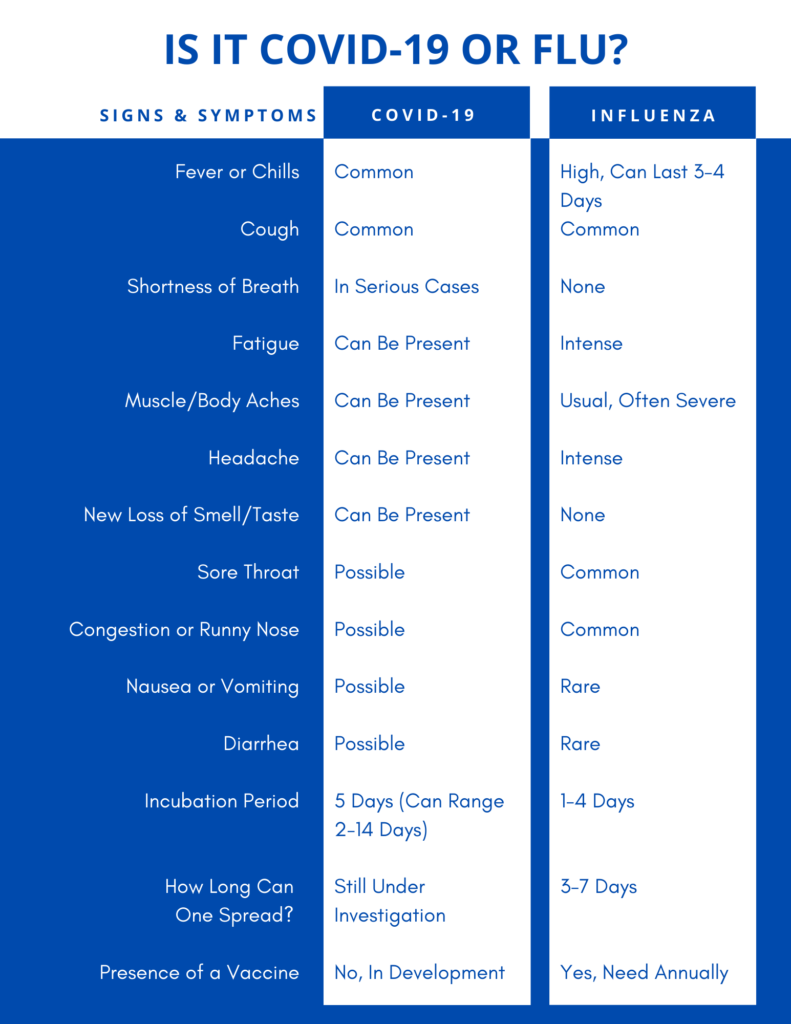Is it COVID-19 or Flu?
October 6, 2020
The Similarities and Differences Between This Fall’s Worrisome Viruses
By: Christine Perdue, PNP
As we enter the Fall there is a lot of talk and concern about two viruses this year: COVID-19 and Influenza (Flu). Flu and COVID-19 are both contagious, viral respiratory illnesses. There are many similarities between these two viruses and therefore testing may be required to confirm a diagnosis. While the Flu is a long-standing and well-known illness by most, COVID-19 is caused by a new coronavirus and therefore there is still a lot that is unknown. This article will help to compare COVID-19 to the Flu.
Signs and Symptoms
It is easy to confuse COVID-19 with the Flu because their symptoms are so similar. Both commonly cause cough, fever, chills, sore throat, headache, fatigue, and bodyache. If your child experiences new onset of loss of taste/smell or shortness of breath, COVID-19 may be suspected.
How Long Symptoms Appear after Exposure
Both viruses have a delay between when exposed to the infection and when one becomes sick, known as an “incubation period”. The Flu’s incubation period is typically shorter than that of COVID-19. With the Flu, a person develops symptoms 1-4 days after exposure. With COVID-19, a person develops symptoms in 5 days, but can also be as early as 2 days and up to 14 days after exposure.
How Long Someone Can Spread the Illness
Both viruses appear to be contagious even before symptoms present. With the Flu a person can spread the illness 1 day before they become ill and for about 7 days after they become ill (most contagious between day 3-4 of illness). The length of contagion for COVID-19 is still under investigation but it appears that people can spread the illness for about 2 days before they develop symptoms and up to 10 days after symptoms start. It is also possible for people to be asymptomatic and still spread the virus for up to 10 days after testing positive for COVID-19.
Vaccine
One significant difference between the two viruses is the existence of a vaccine to decrease the risk of exposure. Long story short – currently there IS a Flu vaccine and there IS NOT a COVID-19 vaccine. There are multiple FDA-licensed Flu vaccines to protect against 3 or 4 strains of the Influenza virus that scientists anticipate will circulate each year. In comparison, researchers are actively working to develop a COVID-19 vaccine, but it does not yet exist.
While we are not able to protect ourselves from COVID-19 with a vaccine, we are able to do so for the Flu. We strongly urge all qualifying people to get this year’s Flu vaccine to help decrease their risk of contracting a respiratory infection this fall and winter. Although telling the difference between the Flu and COVID-19 can be challenging, with the increased protection against the Flu that the Flu shot provides, if your child has Flu-like symptoms, it is possible that COVID-19 may be to blame.
About Gateway Pediatrics, PA
Gateway Pediatrics is celebrating 10 years of serving newborns through 21 years of age in Salisbury, MD. Their mission is to provide quality, evidence-based pediatric care with an emphasis on individual needs. They are “The Gateway to your child’s healthy future!” Learn more at www.gatewaypediatrics.com.




Add a Comment